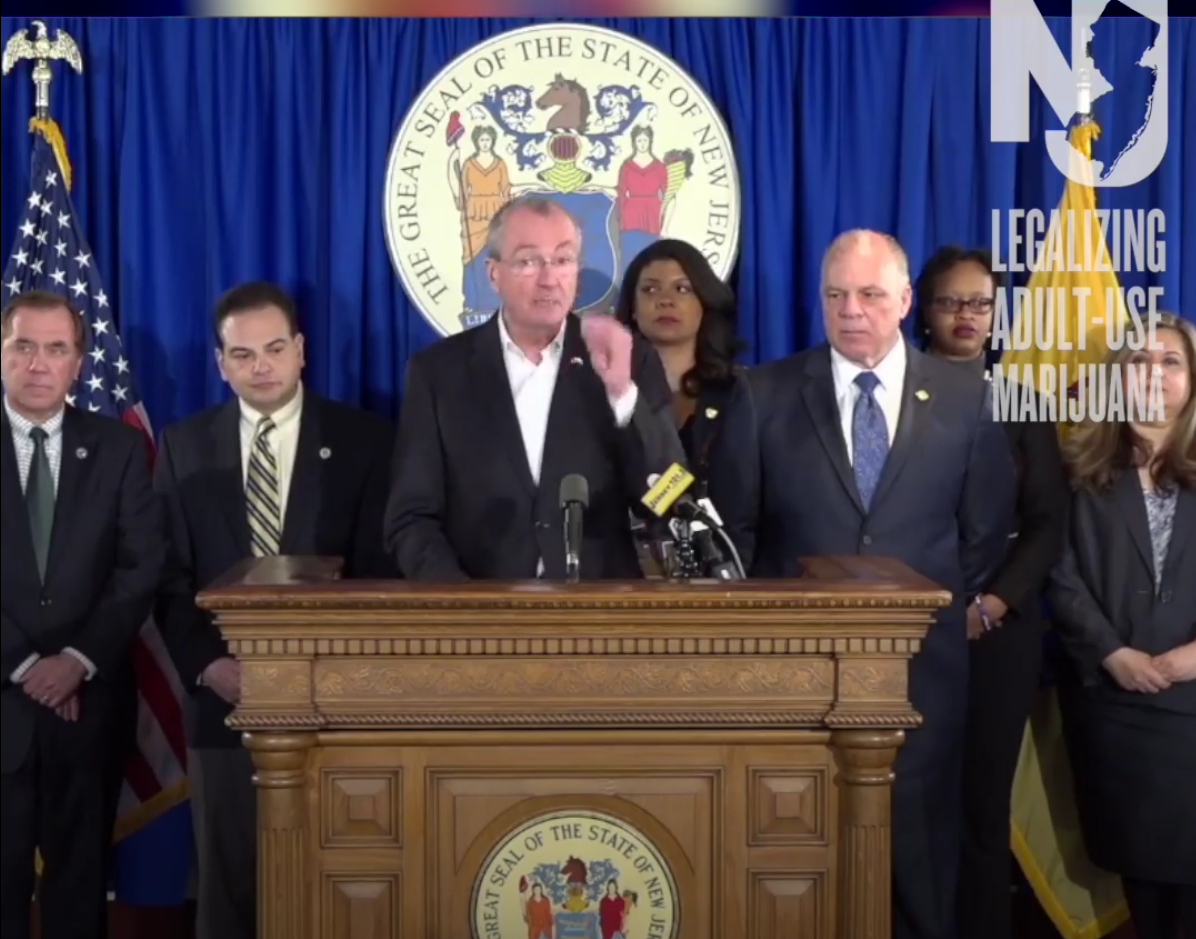
BY MICHAEL OLOHAN
OF NORTHERN VALLEY PRESS
HACKENSACK, N.J.—Five key statewide leaders—representing advocates and opponents—offered a range of opinions on the future legalization of marijuana in New Jersey, while highlighting the uncertainties of what such legalization may bring at a luncheon forum Jan. 25 in Hackensack.
The leaders from politics, civil liberties, law enforcement, banking and the cannabis industry covered most aspects roiling a legislative and social debate over legalization and left over 100 attendees at Bergen Volunteer Center’s Fifth Friday luncheon at Stony Hill Inn with many lingering questions and concerns.
The hourlong panel discussion was “The Status of Cannabis in Bergen County: Canna-Business? Canna-Town? Canna-Bank?” and featured state Assemblywoman Valerie Vainieri Huttle (D-37); New Jersey CannaBusiness Association President Scott Rudder, Bergen County Sheriff Anthony Cureton; ACLU Policy Counsel Dianna Houenou; and Kind Growth Capital Business Development Director Todd Sherer.
Archer & Greiner’s Managing Director of Public Affairs Bill Caruso emceed the panel.
The phrase “so many unanswered questions” was how Assemblywoman Huttle characterized the panel discussion of New Jersey’s ongoing statewide legalization debate.
Disparate concerns
Social justice concerns, tax revenues, impacts on local police and emergency services, expungements for previous pot convictions, the rapid expansion of New Jersey’s medical marijuana program and “so much more evidence that we need” were among disparate concerns voiced by a panel assessing possible impacts of marijuana legalization on children and adults.
“I will tell you this: Let’s do one thing, get it right first; this medical marijuana has been around [and] we’re still tweaking it. Let’s see how that goes,” cautioned Huttle at one point.
Huttle noted that even major medical associations, including the American Medical Association, have not yet endorsed medical marijuana’s use and said she wanted to play “a little bit of a devil’s advocate” to the “business side…of marijuana legalization.”
Huttle said science still hasn’t determined how the brain adapts to marijuana. She noted in Colorado since 2014’s approval of legalized marijuana, the state has seen increased state revenues and a decrease in violent crimes, but an increase in homeless population and one hospital showed a 15 percent increase of babies with THC in blood.
Huttle said marijuana-related hospital visits nearly doubled between 2011 and 2014, and highlighted the risk that marijuana-infused edibles—such as candy—may pose to children.
Under the proposed bill, Huttle said towns can opt out for a period of five years by doing so within six months of legalization.
ER visits up, then down
Rudder said when Colorado first legalized cannabis, the state saw “an uptick in emergency room visits” because people were using cannabis for the first time.
But since then, he said, there has been a decline in emergency room visits.
Cureton said “equal treatment under the law” was critical and that previous marijuana possession convictions had disproportionately target people of color.
He said law enforcement has “some real serious concerns,” including retraining of canines and training of officers as drug recognition experts.
He said officer training would have to be “fast-tracked” given marijuana’s impending legalization.
He said additional funding for officer training was included in the pending legislation. Cureton said the impacts of legalization on young adults is another concern, including education of youth to not use marijuana and drive a vehicle.
‘So many variables out there’

Cureton said he hoped legislators would address the “many different variables.”
Caruso, who moderated the session, noted the ability of municipalities to tax “is a real key part of this debate” and will allow towns “to supplement” some local costs, including law enforcement training.
Current legislation permits towns to add a 2 percent local excise tax to the proposed 12 percent state marijuana tax.
Houenou, of ACLU, said the war on drugs that began in the 1970s “was explicitly created to target people of color and other marginalized communities.”
She said there was “an explicit racial background to the war on drugs” and that Nixon aide John Ehrlichman admitted that in interviews in the 1990s.
“We have to include racial justice when we’re talking about undoing the harms of our failed drug policies,” she said.
She said in New Jersey blacks and Latinos are arrested for pot possession three times as often as whites.
Pot arrest impacts
She said statewide 32,000 arrests for pot possession were made in 2016. She said impacts from these arrests include jail time, fines of up to $1,000, job loss, and an impact on future employment. Moreover, housing, financial aid, deportation and future adoption of a child can be affected by a pot possession arrest.
Houenou said expungement of prior criminal records for low-level possession, along with jobs set aside for undeserved communities and funds for community programs, need to be included in legalization legislation.
Houenou said merely decriminalizing marijuana would not eliminate arrests for low-level possession of pot.
She said decriminalization does not “really get to the racial and social justice goals” that need to be addressed. She said decriminalization does not generate any revenues to go back to communities and does not regulate the cannabis market.
“You really don’t know what you’re getting when you’re buying it” under decriminalization, she said, noting though criminal penalties are removed, civil penalties are still imposed, which can mean major fines and costs, severely impacting low-income individuals and minorities.
Top cannabis concerns
Rudder also said in 1971 that President Nixon made cannabis a “Schedule 1” drug under the federal controlled substances act, the most restricted category of addictive drugs.
He said the top issues people care about with legalization include teenager usage, impaired driving and crime.
He said teenage use of cannabis is “at a 20-year low.” He said Colorado in 2012 had the “highest teenage cannabis use” and in 2017 it went down to seventh nationwide due to regulation and education following legalization.
He said cannabis “does not even have the addictive quality of sugar.”
He said Colorado 2016–2017 data showed reductions in impaired driving due to cannabis use. He said “we need to understand cannabis for what it is, not what we fear it to be.”
He said the people who consume cannabis do not commit more crimes than those who do not.
‘Look just like everybody’
“The people who consume cannabis either medically or adult use, they look just like everybody in this room, and they are just like everybody in this room,” he said.
He noted the 2 percent local excise tax can fund training for police officers and education and said initially 70 percent of Colorado towns opted out of local cannabis.
“It should be regulated, it should be taxed, those revenues should go back to the towns,” he added. He said New Jersey will “eclipse” Colorado in terms of revenues and jobs from a new cannabis industry.
Sherer, of Kind Growth Capital, said his financial institution started providing debt financing to cannabis companies in Colorado when the cannabis industry started there five years ago.
He said companies being financed by his company employ thousands of individuals with well-paying jobs, benefits and opportunities for growth. He said the “vast majority of cannabis businesses” are now able to get bank loans and bank accounts.
‘A tremendous opportunity’
He told bankers in the room “there’s a tremendous opportunity” for financial and banking entities to service cannabis companies and noted there are “dozens of national institutions” that currently allow cannabis businesses to deposit funds.
In mid-December, both an Assembly and Senate budget committee released versions of a bill to legalize recreational marijuana but neither was posted for a vote in either chamber.
Media reports indicated that sticking points included the amount of tax on cannabis sales (12 percent and a 2 percent local excise tax is proposed) although Gov. Phil Murphy is reported to want more; and a process for expungement for prior convictions of an ounce or less of pot were not yet clarified in the bills.
Other Democratic legislators reportedly want expungement for prior low-level pot dealers, which is not in proposed legislation.
Moreover, the state League of Municipalities—a lobbying organization which represents 565 municipalities—has advocated for a higher local excise tax—requesting up to a five percent tax for local costs.
In addition, the League requests direct funding for costs for training local officers as rug recognition experts; wants assurances that local zoning will control all marijuana enterprises, and requests funding for increased administrative costs, including possible higher local insurance and litigation costs.
None of these points are addressed in the proposed bill.
Huttle provided a legislative overview and noted the Office of Legislative Services—a nonpartisan state agency—reported that New Jersey may generate about $210 million in annual taxes from the cannabis industry given the 12 percent tax rate proposed in current legislation.
She noted that if the votes to pass a legalization bill are not there, legislators may put the issue as a ballot question in November.
Huttle noted the locations of New Jersey’s six existing medical marijuana dispensaries and the six new dispensaries recently approved.
Approximately 37,000 patients are enrolled in the program, which just approved medical marijuana to treat opioid addiction—an epidemic that killed 3,118 people in 2018, about eight per day.
The 2018 opioid overdose death rate was a 13 percent increase from 2017.
Among more than a dozen municipal officials present Jan. 25 were Englewood City Council President Katharine Glynn, City Attorney William Bailey and Tenafly Chamber of Commerce President Christine Evron, as well as Bergen County mayors and community leaders.



